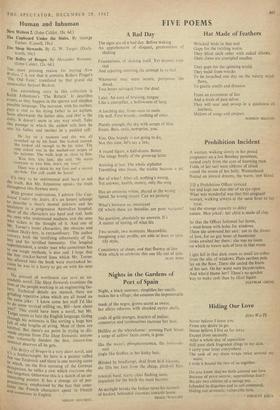Human and Inhuman
The Belfry of Bruges. By Alexander Reissner. (John Calder, 12s. 6d.) THE most pressing reason for buying New Writers 2 is not that it contains Robert Pinget's 'The Old Tune,' translated by that grand old stonewaller Samuel Beckett.
The astonishing story in this collection is Keith Johnstone's 'The Return.' It describes events as they happen in the sparest and simplest Possible language. The narrator, with his mother, pays a visit to his dying father in an asylum. Soon afterwards the father dies, and that is the story. It doesn't seem in any way small. Take this passage in which the author tells how he sees his father and mother in a padded cell: He lay on a mattress and she was all crouched up by his head. She looked starved. She looked old enough to be his sister. The only colour was in the washed-out stripes of his PYjamas. The walls kept us close to him. `Kiss him, kiss him,' she said. 'He wants everyone to kiss him, don' e my love?'
There was a drain by my foot and a second Spy-hole . The cell could be hosed.
It's easy to be sentimental and hard to tell the truth. But Mr. Johnstone speaks the truth throughout this flawless story. With greater reservations, I admire The Cup- board Under the Stairs. It's an honest attempt to describe a man's mental' sickness and his treatment in a progressive Australian hospital. Most of the characters are hard and real, both thc ones who understand madness and the ones who sicken at the thought of it. And one of Mr. Turner's lesser characters, the obscene and violent Dicky-boy, is extraordinary. The author
boy both the terrifying inhumanity of the ooy and his terrified humanity. The hospital superintendent, a tender man who sometimes has to use tough methods, is also real. I hope that the few cracker-barrel lines which Mr. Turner has allowed into the book were overlooked be-
cause he was in a hurry to get on with his next novel.
amount of worthiness can save an un- readable novel. The Shop Stewards examines the lives of the people working in an engineering fac- tory. Technical details are massed, there are grinding repetitive jokes which are all based on the same joke 'I know some hot stuff I'd like to do some vertical milling on, Bill—how about VII?' This could have been a novel, but Mr. through seems to hate the English language. Going foarou.o. so his sentences is like sorting a huge box Lanl of odd lengths of string. Most of them are '1/411otted. But there's no point in trying to dis- sUado anyone from The Shop Stewards; anyone who voluntarily finishes the first, sixteen-line sentence deserves all he gets. it. The Belfry of Bruges is a very short novel, and s a featherweight. Its hero is a painter called ;an van Terdonck and there is one moving scene 'n Which, on the first morning of the German loecupation, he milks a cow which everyone else as forgotten. Otherwise this is a sketch of an un- interesting painter. It has a strange air of pur- poselessness, emphasised by the fact that some- times the French characters speak in French a d sometimes in English.
ADRIAN MITCHELL






























 Previous page
Previous page